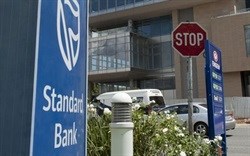With the government's new drive to assist informal businesses, corporates are increasingly looking to invest in and help build township economies. But if it doesn't make commercial sense it has little chance of being sustainable, a fact that Standard Bank has discovered.

Photographer: Martin RhodesImage source:
BDliveSix years ago the bank launched its Access Point product, a point-of-sale device that allows customers to withdraw cash and buy cellphone airtime and electricity vouchers. Some devices enable people to send and receive payments.
Offering these services helped the bank to meet its obligations under the Financial Sector Code of boosting financial access to the poor.
Standard Bank signed up more than 5,000 retailers and spaza shops to use the device, but today there are only 1,600 active trading points.
Nitesh Patel, head of customer financial solutions at Standard Bank's personal banking division, says the bank decided two years ago to remove the devices from operators where they had proven not to be commercially viable. Many of the outlets didn't have sufficient sales volumes to justify continuing to rent the device, while some stores, mainly those in rural areas, battled with poor cellphone network coverage.
"For the store owners it became annoying at times because during peak times the signal would drop and then they couldn't process transactions," Patel says.
Initially all the devices came with Instant Money functionality, which allowed customers to make payments to a third party or receive payments from others. However, the bank removed the functionality from devices in smaller stores, because it proved difficult for them to abide by the Financial Intelligence Centre Act (Fica) requirements that stipulate that when a transaction is made both the sender and the receiver must be clearly identified.
Now Standard Bank allows only larger stores such as Spar, Cambridge and Rhino Foods to have the Instant Money functionality. The Fica requirements mean that when sending payments, people in charge of trading points have to ensure a copy is made of a user's ID. Most spaza shops don't have the means to make copies, and Standard Bank had to help source and fund copy machines.
When the machines broke down or the paper ran out, some spaza shop owners expected of the bank to send someone to repair or replace them, despite the contract's stipulation that the store owners were responsible for maintaining the equipment.
"You don't just make a copy of the ID - you have to put it under a UV (ultraviolet) light. So we had to put UV lights in a lot of the stores. And then the UV lights were breaking and we had to replace the globes," he says.
"Compliance legal contracts don't work well in this environment."
Because the Fica compliance obligations remained Standard Bank's responsibility, it initially repaired and replaced the copy machines and ultraviolet lights, but then the bank decided that the store owners should pay half of the maintenance costs through the rental fees.
Stores then began to terminate their Access Point contracts, Patel recounts.
Sydney Majoko, a business owner who still uses the device at his International Butchery in Tembisa, complains that the first version had many network issues and customers had to wait two minutes or more for an airtime transaction.
When the device was first introduced he made 50c on each cash withdrawal by a customer. Standard Bank changed this to a percentagebased fee on each withdrawal. Now, after the cost of the rental of the device has been deducted, he only breaks even occasionally.
"Standard Bank made a lot of fanfare (when it launched) but didn't give the product a lot of support," Majoko says.
But the Standard Bank device remains a powerful tool for business owners looking to boost foot traffic to their stores, as Andy Moore, who helps manage three butchery and grocery stores, has discovered.
"When the device works, it works well," he says, pointing out that last month the group's Tzaneen store customers made withdrawals totalling R125,000 in a single day.
At month end, his staff go out to the long queues at ATMs to tell people they can withdraw money elsewhere, he says. He is hoping to increase withdrawals to a total R200,000 in a single day this month.
Moore estimates that almost half of the customers who come to the shop to make a withdrawal on the Access Point device end dup buying something off the store' s shelves.
But Standard Bank no longer believes it will make money on the device. When the bank had 5,000 access points, the cost of running and maintaining the system was more than its income in commission fees.
The bank only broke even with the product earlier this year - and then partly only because the hardware had depreciated in value.
"I think the lesson for us was mainly around the fact that you had to get the commercial viability right for the store owner and for us - and it was based on the store owner generating sufficient foot flow," Patel says.
















































